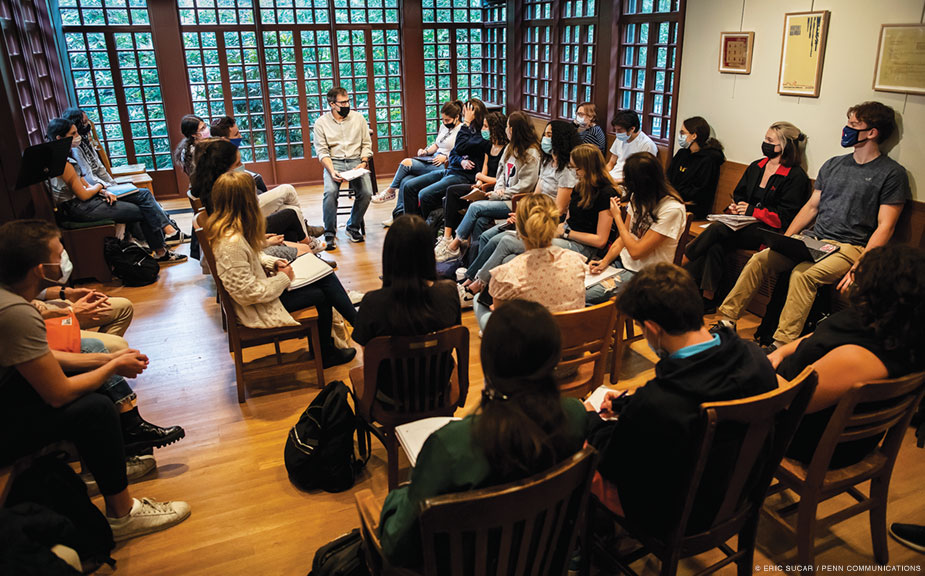
Four students in a Holocaust class last semester were children of alums who had taken the same class.
Al Filreis, who began teaching at the University in 1985, got a surprise last semester in his fall 2021 course, “Representations of the Holocaust.” Out of 38 students enrolled, four were children of people who had taken the course in the 1980s or 1990s—and a fifth was the daughter of an alum who’d taken a different Filreis class.
Filreis, Penn’s Kelly Family Professor of English, had taught children of former students before. But to have four in one semester, representing more than 10 percent of a class, made him feel “proud of my persistence and longevity,” he says. “And also amazed that I’m still teaching this same class and that the course itself has a kind of alumni community.”
Rachel Sherman C’95, an attorney whose grandparents were Holocaust survivors, had a number of reasons for encouraging her son Josh Sherman C’25 to take the course—which he did during his first semester at Penn. She recalls the class in 1994 being “challenging, thought-provoking, intense, and inspiring.” She and other former students have extolled Filreis’s methods of inspiring discussion, such as “cold-calling” on students to get them out of their comfort zone or continuing discussions outside of class through a listserv when that was a novelty. “It was such a unique class structure and created an energy and buzz that was unparalleled in any other class I ever had,” she says.
The course description stresses that it’s “not a history course” but instead is “about the intense difficulties faced by those who have felt the urgent need to describe their own and/or others’ experiences during the genocide of European Jews and many other people, 1933–1945.” Using video and audio recordings of survivors’ testimony, as well as books and documentary films, the course aims to “explore the complex options such witnesses have faced as narrators, allegorists, memoirists, scholars, teachers, writers, and image-makers.” It also encourages students to “learn how to empathize” with those who avoided talking about or repressed the atrocities they had seen.
Sandi Stanger C’94 wanted her daughter Arielle Stanger C’24 to “experience Al’s teaching,” calling it “pretty remarkable that the legacy of his teaching has extended to a second generation of Penn students.” The Holocaust course also “hit particularly close to home” for them since Sandi’s grandmother—“still an incredible force at 99”—is a survivor of Auschwitz. Sandi even sat in on the class with her daughter several times. “We regularly discussed the class as she was taking it,” Sandi says. “I saw the same things I had experienced almost 30 years earlier—a true collaboration. The subject matter obviously is more raw, more emotionally wrought than most courses.
“The reason Arielle wanted to take Al’s class, and the reason I wanted her to take it, was obviously to immerse herself in the subject matter—to hear the testimonies, to be a link in the chain of witness.”
Arielle, an editor of 34th Street Magazine, says that her great-grandmother has never spoken about the Holocaust, but “I always wanted to learn more. I thought that with each bit of information I gathered, I was one step closer to seeing the whole picture. The way we study the events of the Holocaust—through literature, testimony, and memoir—not only taught me how to bear witness to the best of my abilities but opened my eyes to a new perspective on the world. I will never be able to fully understand the experiences of others, but what I can do is be a better listener.
“Instead of craving information from my great-grandmother, I’ve come to peace with it,” she adds. “I don’t question why she doesn’t want to talk about it, and now I feel even more present when I spend time with her. I’m infinitely more appreciative of her after having taken this class.”
Sherman felt it was important for her son to take the course because “Josh will be part of the last generation to actually be able to meet Holocaust survivors.” The Jewish Federations of North America estimates that only about 80,000 survivors remain in the US, many of whom are 85 and older. “As the great-grandson of Holocaust survivors, Josh understands his responsibility in educating future generations about the Holocaust.”
Analysts of modern politics often invoke the lessons of the Holocaust as shorthand to warn against the dangers of propaganda, fascism, and staying silent. But future generations may be too removed from survivor testimony to fully comprehend the horrors. A course like Filreis’s may help them understand the intricacies of what happened.
Josh Sherman’s father, Mark Sherman C’95, also took the course in fall 1994 and notes that the class discussions continue to influence his work as a criminal defense attorney.
“I told Josh that Al was going to open his mind and challenge him like never before,” he says. “Al taught us a ton at Penn—how to tell a story, how to write, and most importantly, how to listen. I practice all of these daily.”
—Caren Lissner C’93




